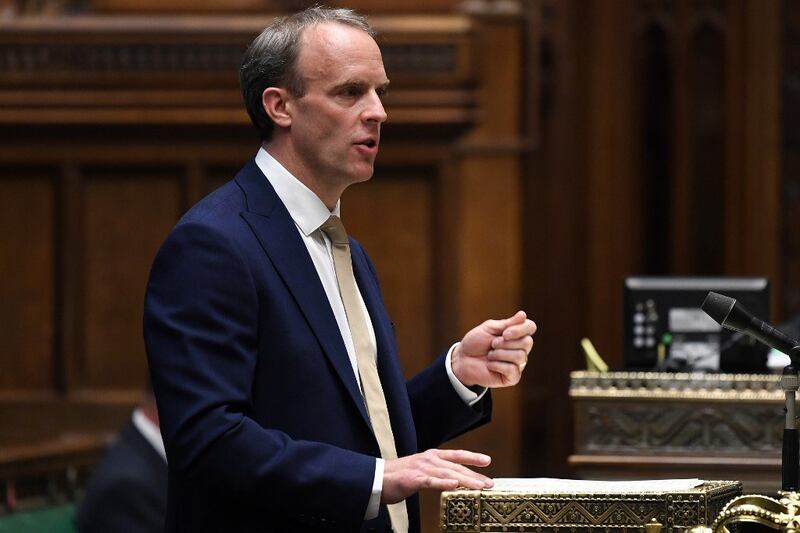China on Thursday hit back at international criticism of its draconian new security law for Hong Kong, saying that the city's residents are under its jurisdiction, indicating that may not be allowed to leave.
After the U.K. announced it would extend residency rights and offer a pathway to citizenship for up to three million of the city's seven million residents, a spokesman for the Chinese Embassy in London said Beijing "firmly opposed" the move.
"We firmly oppose this and reserve the right to take corresponding measures," it said in a statement. “We urge the British side to view objectively and fairly the national security legislation for Hong Kong, respect China’s position and concerns, refrain from interfering in Hong Kong affairs in any way."
The spokesman said the U.K. had broken its promise not to offer right of abode to Hongkongers made in the 1984 Sino-British Joint Declaration governing the 1997 handover of Hong Kong to Chinese rule.
"It is made clear in [an interpretation of China's nationality law by Beijing's National People's Congress (NPC) standing committee] that all Chinese compatriots residing in Hong Kong are Chinese nationals, whether or not they are holders of the British Dependent Territories Citizens passport or the British National (Overseas) passport," the spokesman said.
Chinese foreign ministry spokesman Zhao Lijian said no amount of pressure from external forces could "shake China’s determination and will to safeguard national sovereignty and Hong Kong’s prosperity and stability."
His comments came after the U.S. House of Representatives on Wednesday joined the Senate in approving a bill to impose sanctions on groups that undermined the city’s autonomy or restrict the freedoms promised to Hongkongers.
"China will definitely take strong countermeasures [if the bill becomes law], and all consequences will be borne by the U.S. side," Zhao told a regular news briefing in Beijing.
Pro-independence flag waver arrested
U.K. foreign secretary Dominic Raab said there would be little his government could do if Chinese were to prevent Hong Kong residents from leaving the city.
"Ultimately we need to be honest that we wouldn’t be able to force China to allow BNOs to come to the UK," he said.
Thousands of protesters marched against the security law on Wednesday in defiance of a protest ban by police, who arrested 10 people under the new law, one of whom was waving a pro-independence flag.
The law takes aim at actions that occurred during anti-government protests last year. It says destruction of government facilities and utilities would be considered subversive, while damaging public transportation facilities and arson would constitute acts of terrorism.
It brings a maximum penalty of life imprisonment for offenses that could include "causing the people of Hong Kong to have misgivings about [the government]," and theoretically applies to anyone on the planet, regardless of the legal jurisdiction they live under.
Hong Kong police arrested a man on a London-bound flight on Thursday on suspicion of having stabbed a police officer in the arm during Wednesday's protests.
The 24-year-old man, surnamed Wong, was arrested on a Cathay Pacific flight after police received an anonymous tip-off about his travel plans, government broadcaster RTHK reported.
U.K. prime minister Boris Johnson said on Wednesday that imposition of the law was a “clear and serious breach” of the Sino-British Joint Declaration, the treaty under which China promised Hong Kong could run its own affairs and enjoy its traditional freedoms of speech and association for at least 50 years after the handover.

'Irresponsible and unwarranted'
The Foreign Office summoned Chinese Ambassador Liu Xiaoming on Wednesday to a meeting with Permanent Secretary Simon McDonald.
Liu said the U.K.'s remarks were "irresponsible and unwarranted."
"The Chinese side urges the UK side to immediately stop interfering in Hong Kong affairs, which are internal affairs of China," he said.
The row escalated as the U.K. granted political asylum to former British consulate staff member Simon Cheng, who reported being tortured by mainland Chinese police in Shenzhen at the height of last year's protest movement in Hong Kong.
Cheng said he believed he would be accused, under the new security law, of colluding with foreign forces and that he would be sent to the mainland for trial if he returned to Hong Kong.
U.K. foreign minister Raab said on Wednesday that the U.K. would live up to its responsibilities to the people of Hong Kong.
However, Hongkongers who were born after 1997 aren't eligible, leaving many of the city’s young student activists left vulnerable to arrest and political prosecution.
Around 2.9 million people are believed to be eligible for the BNO immigration pathway, as well as their immediate dependents.
Australia said it could offer tens of thousands of 'safe haven' visas to Hong Kong residents who want to fleet he city, with prime minister Scott Morrison saying that his government is "very actively" considering such a plan.
Reported by Wu Hoi-man and Fok Leung-kiu for RFA's Cantonese Service. Translated and edited by Luisetta Mudie.
